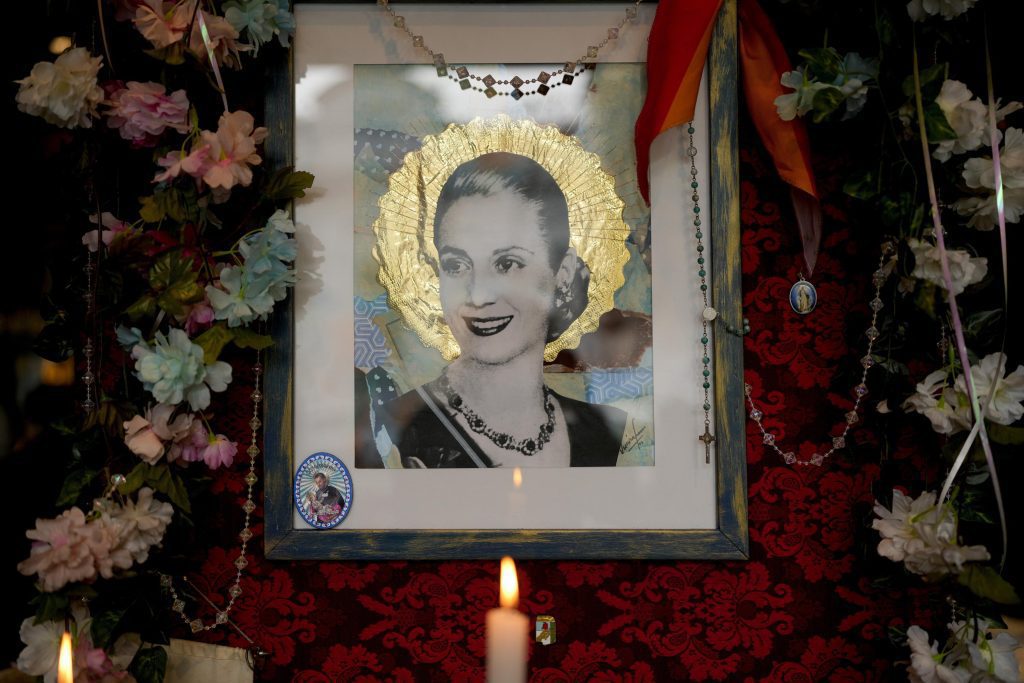Written by Daniel Politi
BUENOS AIRES (AP) — Maria Eva Noble says she’s carrying out a legacy that bears her name when she works in a poor kitchen in a working-class neighborhood in Buenos Aires.
It is named after Argentine former first lady Maria Eva Duarte de Perón, better known as Eva Perón, or Evita, who died 70 years ago on Tuesday. The soup kitchen where Noble is on voluntary duty in the Flores region serves daily lunches for about 200 people and is run by an organization also named after the late leader.
Although Nobel is not related to Eva Peron, Nobel says, “I carry Evita in my DNA.” And she’s not the only one who feels this way.
Seven decades after her death, Evita continues to reawaken sentiment in Argentina as her followers believe her image as a champion of the poor is more important than ever at a time of rising inequality and poverty as the economy continues to stagnate amid accelerating inflation.
Evita has been the subject of countless books, movies, TV shows, and even a Broadway musical, but for some of her oldest and most ardent followers, connecting with the actress turned political leader is more personal.
Joanna Marta Barro was one of dozens of people who queued on Tuesday morning to leave flowers and pay their respects at Evita’s grave in the Recoleta neighborhood of the Argentine capital.
With tears in her eyes, 84-year-old Barrow recalls how her life in northern Tucumán province had improved after Evita’s emergence on the political scene, suddenly having better shoes and school uniforms.
“Thanks to her I got my first backpack,” Barrow said. “She is a torch that lights up in my heart.”
Evita was born in a modest home in Los Toldos, a small rural town about 300 kilometers (186 miles) from the capital, where she moved when she was 15 to fulfill her dream of becoming an actress. A decade later, she met Juan Domingo Perón, a military officer who was a government official.
Evita was by his side when Perón won the presidential election in 1946 and took on an unprecedented role as a powerful first lady, putting herself at the forefront of women’s rights issues, including suffrage that was approved a year later and the creation of the Foundation to Aid Workers and the Poor.
As much as Evita was loved, she was equally hated by many of the country’s rich and powerful who were concerned about her growing popularity and influence.
Her time in the spotlight was intense but short as she died of cervical cancer at the age of 33, leading to an outpouring of grief in the streets as the South American country went into mourning.
Perón ended up being elected president two more times and was the founder of a political movement – Peronism – that has dominated Argentine political life to this day, with many leaders with divergent ideological views claiming loyalty to the former general.
“Perón was respected, he was obeyed—you either agree with what he said or not. But Evita was loved or hated,” said Felipe Pigna, a historian who has written extensively about the former first lady, and she ended up contributing a strong dose of emotion to Perón “.
For some, these feelings persisted.
Maria Eva Sapir joined nearly 100 other people a day before the anniversary of Evita’s death to dress up as her as part of a performance that paid tribute to the former first lady.
Sapire is named after Evita and now she is talking about it with her daughter.
“When you listen to her sermons, it is amazing how many things are still valid after so many years,” Sapir said.
Others who came to admire Evita later in life often say that feeling that she was ahead of her time on many issues, especially women’s rights, is what led them to join her legions of fans.
“Young people in particular see a rebel in Evita, a character who did not bow her head or give up” and who ended up dying “young and beautiful,” Peña said, contributing to the construction of a “pop icon.”
“Eva is a charming character,” said Alejandro Maci, director of the new series “Santa Evita,” which premieres Tuesday on Disney’s streaming services, based on a novel by Argentine writer Tomas Eloy Martinez.
Perón and Evita continue to be the subject of criticism inside and outside Argentina. Some say, for example, that Evita used money from the state to carry out what she described as charitable work to build her image as a saint figure and help her husband increase his popularity. Others also point to allegations that the couple received money from the Nazis to help perpetrators of war crimes hide in Argentina after World War II.
Cristina Alvarez Rodriguez, Evita’s niece who is now a minister in the Buenos Aires provincial government, said she was particularly impressed by the number of “very young girls who have tattooed Evita on their skin” and now “make it direct the light”.
Many now yearn for a character like Evita.
For some, the current government of President Alberto Fernandez, who describes himself as Peroni, has deviated from those principles.
“The Argentine people feel betrayed. Peronism never came to starve people, and that is what is happening now,” said Matteo Nieto, who holds pictures of Perón and Evita at his pizzeria in the northern city of Posadas, near the border with Paraguay.
Nieto said that “the government in power calls itself Peronist, but in fact it is not Peronist.”
“We really miss someone like Evita, it would be great to have a leader like her at this time,” he said.
Maci, the director, sees Evita as an “interesting metaphor” for thinking about the kind of country Argentines want at a time of rising poverty and inequality.
“This woman suggested a society with more mobility, which is exactly what Argentina doesn’t have now. It lacks any kind of social mobility, and if it has any kind of mobility, it is sloping down.

“Beer buff. Devoted pop culture scholar. Coffee ninja. Evil zombie fan. Organizer.”



/cdn.vox-cdn.com/uploads/chorus_asset/file/24043392/chromecast.jpg)



More Stories
House Democrats are helping Johnson avoid defeat on foreign aid bills, despite GOP defections
House GOP aid bills for Israel, Ukraine and Taiwan advance — with help from Democrats
In an unusual vote, Democrats save the measure to allow a vote on the Ukraine bill